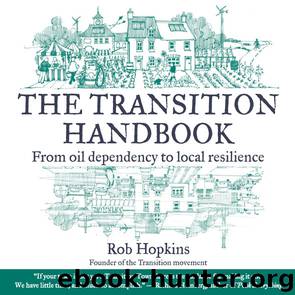Transition Handbook by Rob Hopkins

Author:Rob Hopkins
Language: eng
Format: epub
Publisher: UIT Cambridge Ltd.
Reflections on the Kinsale process
The KEDAP arose from a programme of community think-tanks, awareness-raising, the work of the students and the inputs of various people in the area with ideas to offer. It is useful to wonder what might we have done differently, and indeed, whether it has made any difference. Firstly, some reflections on how it might have been done differently.
The process was not really as embedded in the community as it could have been – certainly nothing compared to the scale of the subsequent work in Totnes, Lewes, Stroud and the other emerging Transition Initiatives. It was principally my initiative and concept (with the support and inspiration of an assortment of others), and despite many of the students having been involved, when I left at the end of term to move to Totnes, no obvious support structure was in place to enable a continuation of the process. The team who had driven it forward were mostly not from Kinsale, and there was no community group in place to carry it forward.
Had it not been for Louise Rooney and Catherine Dunne (both former students), who formed Transition Design, continuing to drive it along, it could have disappeared without trace. From this I learned that it is essential to root the process in the community. I can however excuse the approach used in Kinsale, in that the Action Plan is, in effect, a suggestion for further action, and once finished was offered to the community to take and develop in whatever way they felt most appropriate. Basically the lesson here is that the process needs an in-built resilience, so that one person can drop out without affecting the project, something that has been better addressed in subsequent Transition Initiatives.
Insufficient awareness-raising
What would have been ideal would have been to have trained students up at an early stage to run peak oil awareness workshops in schools, youth clubs, gardening clubs – to anyone who would listen. The reason we didn’t do this in Kinsale was constraints of time. To start with, we didn’t know what the process we were developing was going to look like, and were still coming to grips even with what energy descent would mean in practical terms ourselves. Now, in the Totnes process, we run the Skilling Up for Powerdown evening class, to better equip people to be able to do this. This also makes the concept better embedded in the community. The problem with Kinsale was that I didn’t live there, so I didn’t know all the groups and networks, something such a training course may well have got round.
Download
This site does not store any files on its server. We only index and link to content provided by other sites. Please contact the content providers to delete copyright contents if any and email us, we'll remove relevant links or contents immediately.
The Lonely City by Olivia Laing(4799)
Animal Frequency by Melissa Alvarez(4467)
All Creatures Great and Small by James Herriot(4314)
Walking by Henry David Thoreau(3955)
Exit West by Mohsin Hamid(3824)
Origin Story: A Big History of Everything by David Christian(3690)
COSMOS by Carl Sagan(3619)
How to Read Water: Clues and Patterns from Puddles to the Sea (Natural Navigation) by Tristan Gooley(3466)
Hedgerow by John Wright(3356)
How to Read Nature by Tristan Gooley(3337)
The Inner Life of Animals by Peter Wohlleben(3313)
How to Do Nothing by Jenny Odell(3297)
Project Animal Farm: An Accidental Journey into the Secret World of Farming and the Truth About Our Food by Sonia Faruqi(3219)
Origin Story by David Christian(3196)
Water by Ian Miller(3181)
A Forest Journey by John Perlin(3070)
The Plant Messiah by Carlos Magdalena(2927)
A Wilder Time by William E. Glassley(2860)
Forests: A Very Short Introduction by Jaboury Ghazoul(2837)
